Everything you need to know about making the move to Norway in one place. You're welcome!
Interested in making the move to Norway? You're not alone, judging by the mountain of email we get every day!
Sifting through these messages, there's always the same questions being asked over and over again, from the immigration rules for various circumstances through to learning the language and finding employment.
Table of Contents
Moving to Norway: Your questions answered
So I thought it would be a good idea to answer them all in one place, and point you towards other articles where we dive into things in more detail. Make yourself comfortable, because we've got a lot to get through.
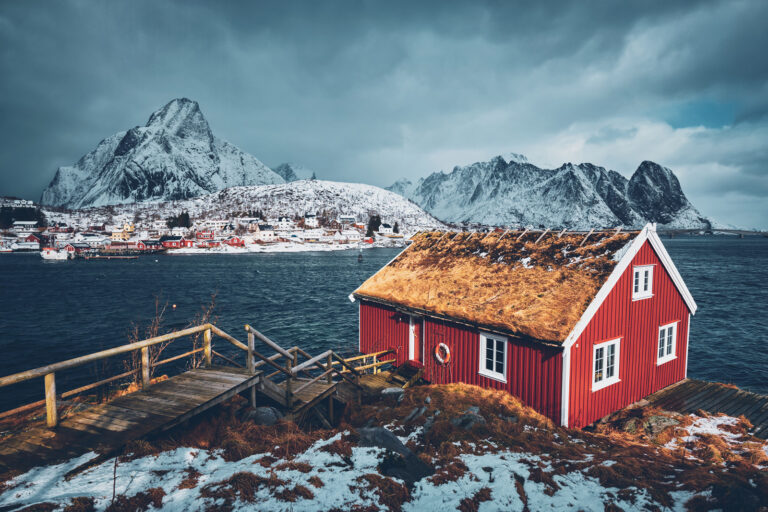
Is living in Norway really so good?
Ah, the million dollar question! The answer, of course, is it depends. To start things off, ask yourself this simple question: what are your expectations?
Read more: Why move to Norway?
Let's say you live a ‘typical' American lifestyle living in Los Angeles but want to move to Norway because you've heard it's the happiest place in the world. You're likely to find it a very hard transition.
The way I tend to explain it is this: Norwegians are happy with the Norwegian lifestyle because they grew up with it, and because of cultural things like janteloven.
A new arrival without this upbringing and cultural touchstone cannot expect to suddenly become happy, especially when you turn your life upside down and lack a network of family and friends.

That said, the foundations for a happier life are absolutely in place. Working conditions are excellent, everyone earns a living wage, and Norway's mountains, fjords and epic coastline offers so much incentive for enjoying a healthier, outdoors lifestyle.
If you believe in paying tax in return for public services and a better society, don't want to eat out all the time, are not a party animal, and enjoy an outdoors lifestyle, then you may well find that Norway is indeed the happiest place on earth!
What are the immigration rules?
Norway has a relatively small population – just over 5 million people – so immigration has the potential to have a major impact on the country.
Much more so than say a person moving to the United Kingdom, where the population 65 million. Or even a person moving to the United States, where the population is more than 325 million.
Immigration requirements depend on many things including your citizenship, reason for immigration, professional qualifications, and your family and financial circumstances.
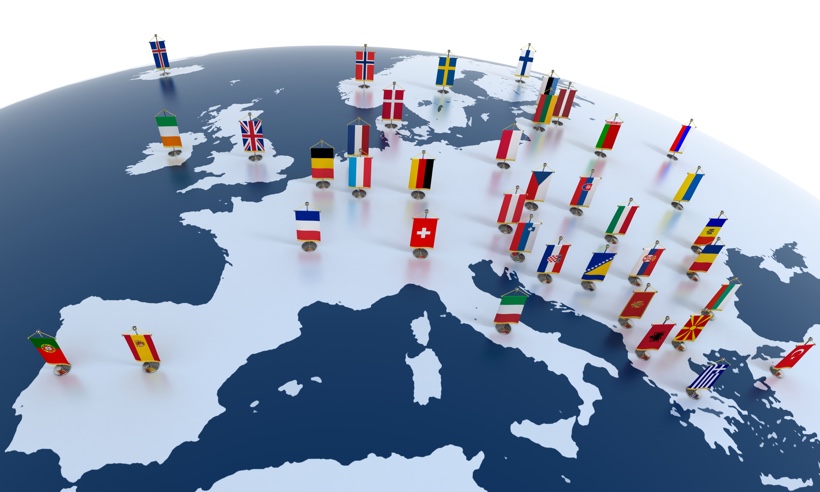
This means it is difficult to provide a thorough overview, but we'll do our best to run through the basics! The most important basic to understand is Norway's relationship with Europe.
Norway's relationship with Europe
Although Norway is not a member of the European Union, it is a member of the European Free Trade Association (EFTA) along with Iceland, Liechtenstein, and Switzerland. This means Norway is a member of the European Economic Area (EEA).
The EEA provides for the free movement of persons, goods, services and capital within the European Single Market, including the freedom to choose residence in any country within this area. What this means is that citizens of EEA member states have a much easier time of things when it comes to immigration.
Moving to Norway from Europe
This is good news if you're a citizen of one of the EEA states. While you'll still need a job to stay long-term, you're able to live in Norway for up to six months to find one, and the registration process is relatively simple.
Of course you'll need money to cover your living expenses and a place to stay while you look for work. EEA citizens are also able to register as self-employed, subject to certain criteria. Read more about moving to Norway from Europe here.
A quick note for British citizens. The United Kingdom is no longer a member of the European Union, nor the EEA agreement. This means that the information above no longer applies to British citizens.

Brits living in Norway prior to the withdrawal agreement had the opportunity to protect their pre-Brexit residency rights. But anyone wishing to move to Norway now must follow the rules for non-EU/EEA citizens, below.
There's more specific information for Brits wanting to move to Norway after Brexit in this article.
Can I move to Norway from outside the EU?
If you are not a citizen of an EU/EEA country, things get much more complicated. Although there is a job seeker permit for certain professions, the general rule is that you'll already need a firm job offer from a Norwegian company to be granted a work permit. The job will need to be of a certain salary to qualify.
This is difficult to achieve outside of industries such as oil and gas, or research. That's because Norwegian employers don't want the bureaucracy and the long wait that comes with processing a work permit.
Remember you're not just competing with Norwegians for jobs. You're competing with hundreds of millions of European citizens, all of whom can start working pretty much straight away.
Moving to Norway from the USA
Having run this website for more than seven years, I've received my fair share of questions about relocation! If there's one nationality that seems keenest to come to Norway, it's the Americans.
Politics aside, this is most likely because of the huge numbers of US citizens who can claim Norwegian heritage. These Norwegian Americans maintain a strong community and interest in all things Scandinavian.
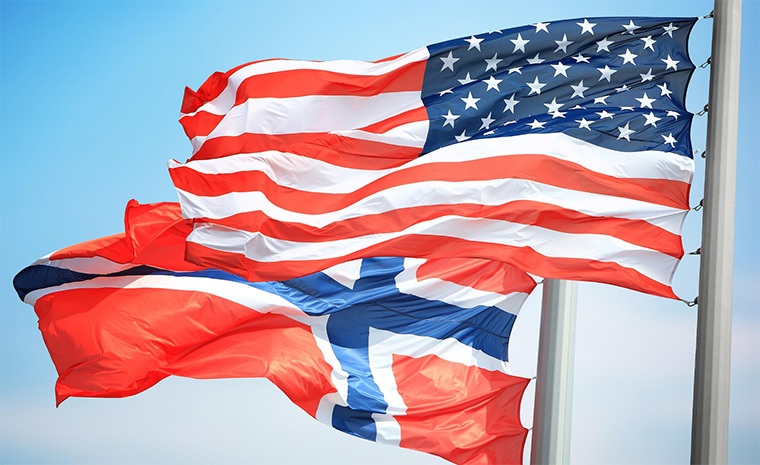
However, contrary to popular belief, having a distant Norwegian relative does not entitle you to Norwegian citizenship and gives you no kind of advantage in the immigration process. Very few countries in the world operate such a system. Sorry folks!
Norway does have a family immigration category in the immigration rules, but it is intended to be used by someone with the right to live in Norway (for example through a work permit) to bring their partner and children live with them.
As to whether a US citizen can move to Norway, the regular immigration rules detailed elsewhere on this page apply. Applying to study here or looking for a job with one of the many American companies based here is a good place to start.
Read more: How Americans Can Move to Norway
How can I find a job in Norway?
So, if the basis of moving to Norway is about employment, finding a job is pretty important, right? Absolutely!
As a small country, Norway has areas with a skills shortage, including ICT, construction, and healthcare. The energy industry remains a major employer but competition for positions is high because of the downturn a few years ago.

For an overview of these and other industries in Norway that employ foreigners, check out our jobs section.
As this is such an important area for English-speakers wanting to move to Norway, I teamed up with a Norwegian recruitment consultant to write a book. It's called How to Find a Job in Norway, and it's available now in eBook and paperback.
How can I study at a Norwegian university?
There are opportunities for international students wanting to come and study in Norway.
The country is a popular destination for international students because tuition is free at public universities. This lowers the barriers for many although the high cost of living must also be considered.
However, this also means that competition for places is very high, simply because there are not that many public universities! Norway is a small country, after all. That said, over 200 master's degrees are available in English, with many more taught in Norwegian or a mix of both languages.
Bachelor's degrees are almost exclusively taught in Norwegian and although foreigners are welcome to apply you must of course must meet strict language requirements.

If you don't yet speak Norwegian, this will mean taking an intensive one-year language course before commencing studies.
Opportunities for studying exist in most fields, but topics such as engineering (especially energy and marine), Nordic studies and Arctic studies are well represented.
You can find out more on our study in Norway page, and read up on the Norwegian education system here.
How do I find somewhere to live?
Finding accommodation in the major cities is becoming quite difficult, especially during the summer when students rush to find a place to live.
Most newcomers arrange temporary accommodation to tide them over for a few months while they look for something more suitable.
The process for renting a house, apartment or even just a room is fairly similar. Most people go though one of the online marketplaces such as Finn.no, or rely on their new employer to help.
Paying as much as three months rent as a security deposit is commonplace, which is another common financial barrier faced by new arrivals. You can read more here about renting a place to live.
Do I need to learn Norwegian to move to Norway?
There is no legal requirement for anyone to learn Norwegian to live in Norway, at least on a temporary basis.

Obtaining permanent residence or citizenship is a whole different ball game, and you'll need documented proof of language ability to claim those statuses.
However, while there is no legal requirement, it is very hard to find a job and build a career without learning the language.
Almost all Norwegians understand English and can speak it to at least an intermediate level, but relying on that to find a job will seriously limit your options.
The best advice is to start learning Norwegian before you even set foot on Norwegian soil. Thanks to the wonderful world of websites and apps, there's some great resource for reading and listening to Norwegian online.
While in-person teaching will give you the fastest route to fluency, online courses such as Norwegian Class 101 and The Mystery of Nils will provide some much-needed structure to your learning, while apps such as Duolingo and Memrise will help you practice.
For a full list of websites, apps and other resources along with general advice for learning Norwegian, you can read our full guide over here.
Where should I live in Norway?
You may or may not have a choice about where to live in Norway. Depending on how in-demand your profession is, you're more than likely going to have to move to wherever you can find a job.
If you do have a choice, or you'd prefer to choose a place and then look for a job there, then read on.
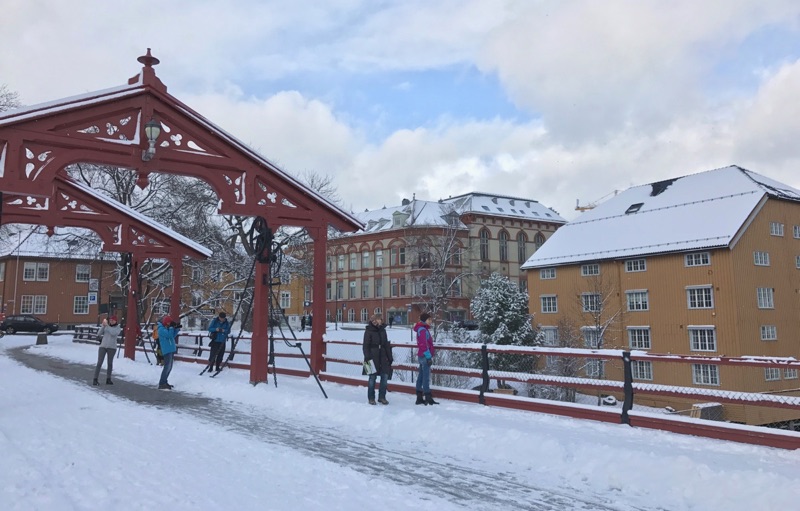
Norway's cities are small by world standards. In my adopted home city of Trondheim, there are less than 200,000 people here and yet its considered Norway's third biggest city. It has a small town feel at the best of times, but in the summer when the substantial student population goes home it can feel even smaller!
Accommodation costs plummet when you live outside the main ten or so cities, but employment opportunities can be few and far between. If you're interested in seafood jobs or agricultural work and prefer a quiet rural life, this could be a a good option for you.
Can I stay in Norway permanently?
Only people who have lived with legal residence/work permits for a certain period of time (usually between 4-7 years) have the right to apply for permanent residence or Norwegian citizenship.
Having permanent residence means that you no longer have to renew a work permit, and gives you more or less the same rights and benefits as a Norwegian should you lose your job.
At present to claim Norwegian citizenship you need to give up your original passport, although dual citizenship is being talked about by the current government and seems likely to pass, eventually.
What are the most important things about Norwegian lifestyle that new arrivals need to know?
Where to begin! This blog has several years' worth of articles about such topics. To save you some time, here's what I would say are the most important things to know.
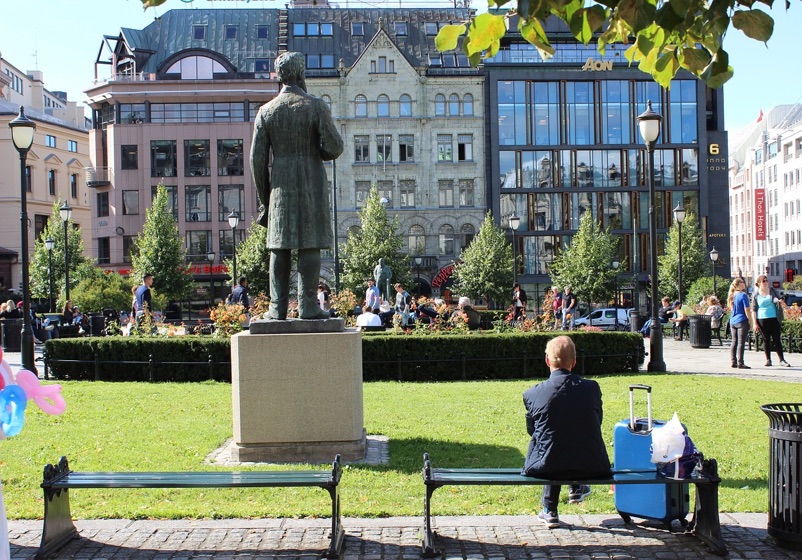
Working life: Perhaps more so than any other nationality I know, Norwegians work to live and not live to work. Holiday time is generous, long weekends are commonplace, and the whole country seems to grind to a halt in the summer. Make the most of it!
Volunteering: Giving some of your time up for voluntary organisations or even to help clean up communal areas in your neighbourhood are fundamental principles of Norwegian society.
Janteloven: The concept that tries to encapsulate the Norwegian (and Scandinavian) societal norms. Janteloven, or the Law of Jante, essentially emphases putting society ahead of the individual, and not boasting about individual accomplishments nor being jealous of others.
Koselig: If you've been caught up in the hygge mania of the past few years, you'll already have a pretty good idea of what koselig is. But check out this visual guide to see how the Norwegians do it.
Digital: Somewhat contrary to the above, Norway and the whole Nordic region is a highly digitised society. On the verge of becoming cashless, most Norwegians don't even carry cash and rely on debit cards, credit cards and mobile payment apps for everyday purchases.
Frequent flyers: Norwegians think nothing of hopping on a plane to zip around the country. Some even commute by plane on a weekly basis.
The country's geography means travelling by other means, while great for tourism, simply takes too long to be practical for everyday needs. If you're new to Norway, make sure to sign-up for the frequent flyer programs.
How much money do I need to move to Norway?
Hopefully if you're seriously considering relocating to Scandinavia then you are already well aware that the region is one of the most expensive on earth. Sure, wages tend to be high especially in Norway, but this is more than offset by the higher cost of living.

How much money you'll need for a successful relocation can be split into two. Firstly, there is your income requirement, which is relevant if you're moving from a country outside the EU/EEA. This varies depending on the work permit you're applying for, but many unskilled jobs will not pay enough to qualify.
Secondly, the actual costs of moving and your living expenses until you are set up with your Norwegian bank account and regular salary.
The biggest expense will be your accommodation, and unless your company offers to help arrange this you can expect to pay up to three months rent as a security deposit.
Are you really ready?
If you haven't yet made up your mind, spend some time reading about some of the difficulties faced by expats who have made the move. Check out The Downsides of Living in Norway and Dear Norway, I Want To Go Home.
Has this article helped you? If so, you can help us by sharing it on social media. If you use Pinterest, we've got the perfect pin for you. Just hit that Pinterest button!

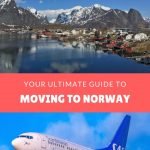

I really do appreciate all the time and effort you are putting into this! You are – and have been – answering most all the basics that come to mind…. thank you! Can you, at some time in the near future, explain the house and property buying process for foreigners? I have talked with Norwegian banks, brokers and agents, with the conversations always diving into the dark abyss of qualifying “D” numbers, personal numbers and establishing banks accounts. At 62, it was even suggested I am too old to buy a house?! Here in the U.S., banks are happy to take my money and approve home loans…. I’m learning it’s far different in Norway!
Very interesting.
Dual citizenship is possible if you are born with another citizenship or if you are born with another due to one parent having another citizenship.
To retain Norwegian citizenship one must apply and be in Norway for 6 months before turning 22.
One thing not covered is the expense and difficulty of getting a Norwegian drivers license if not from EU. Costs about 30000 kroner all told. Foreign license is only valid for 3 months.
My 49 year old Norwegian daughter and fam have recently emigrated to Norway and her license is one of her most prized possessions now! She has dual citizenship as have all my children and grandchildren who are each spending a gap year in Norway to retain their citizenship.
Regards
Colleen Ellefsen
Having lived in Oslo for 2 years I really think people need to hear more about the possible disadvantages than advantages of living here.
My partner and I do not go out clubbing, do not drink alcohol and love nature yet still find living in Oslo somewhat boring .
Even though we both have good jobs we still find it expensive to live and the cost of learning Norwegian is quite high.
There is alot to love about Norway for sure but if you are two immigrants that have no ties here, it is very hard to settle.
We are leaving Norway and I will miss it but I do not see myself staying here longterm.
Lol,
“I don’t like doing city things, the city is boring.”
“Living in the capital is expensive.”
These are not concerns for most who could think about things like these before they move.
Nice but please Am from Ghana and I need a Job there please what are some of the process I need to know?
Hello
I find it interesting that you dont mention anything about education jobs including working in child welfare and working with kids with special needs including autism and english schools. I was told by a few people in my recent visit to oslo, there is a need for this type of work and americans would be especially welcome. Please comment on this matter and how would k i go about finding a job.
I would say qualifications matters more than where you do come from.
My partner and I retired and are interested in purchasing a home in Norway so that we can live there part time. Are there rules on none citizens owning property?
Wow, you asked this in 2019 and not a single response… Does anyone know the answer to this?
Probably much too late to reply to to you, but I think that if you plan on using the property as a holiday home (instead of making it your permanent home), you can not get a Norwegian housing loan. Otherwise it should be easy and straightforward. Not a lot of red tape.
I lived in Stavanger for 7 years. Just a short version of my pros and cons in case it is helpful for anyone!
Pros:
– Safe, low crime. I never feel threatened.
– Good place to bring up kids (and nursuries are subsidised so its relatively cheap)
– Fantastic hiking oppotunities if you like exploring the outdoors.
– People are in general polite and not aggressive or threatening. I never feel as though im being ‘judged’!
– Low level of bureaucracy: Buying a house, a car, online banking, healthcare is all made relatively straightforward. (most of the time anyway!)
– you can go fishing anywhere on the coast! I keep a rod in my car boot and sometimes stop off by the shore if im passing and feel like fishing for 20 minutes.
Cons:
– The climate is horribile (at least in Stavanger. ive not lived in the other cities). Cold wet and windy ALL year round, not just winter. I am now sick of people saying ‘no bad weather, only bad clothing’. People who say this have probably never actually been outside in Stavanger.
– Norwegians are reluctant to befriend you. They are polite, but thats it. It is therefore possible to feel very lonely here.
– It can be a little dull! If you like towns and cities, there is not a lot going on. Sitting on the sofa with a coffee watching the drizzle out the window is my hobby now.
– Tradesmen are insanely expensive if you need work done on your house, and you are not permitted to perform your own plumbing/electrical work.
People say Norway is expensive, and it is, but if you earn an average wage here, and are not stupid with your money (out partying every night), it is possible to live a good life and save money.
This question is a good one. I’m in a wheelchair and wanted to know if that would cause more hassle for me? How wheelchair accessible is Norway? Also, what are the requirements for healthcare?
I’m full blooded Norwegian and born in the u.s.a. I’ve considered moving to Norway to where my ancestors are. Would it be a problem to purchase land for my family members who wish to join me if I’m able? We are carpenters, mechanics, electricians and artists along with a variety of other talents. If it’s possible to buy a piece of land could someone please tell me? Thank you!
I think it is important to understand for anyone who is born in the US, regardless of their heritage, that the American government has a tax law which is causing HUGE issues for some people here in Europe at the moment. it is not talked about but should be!
Even if you dont hold a US passport or even have a US social Security number, let alone live in the US, the US government expects you to submit a tax return every year to them!! DO look into this before you move from the US, I have read that this is causing people to lose their bank accounts where they live in Europe, and the fact that your personal details are exchanged without your knowledge or permission is huge as well.
Norway and the US have a tax agreement that ensure you don’t pay tax to both country. At least that’s how it is for a norwegian to move to the US.
I am a Norwegian citizen. My parents moved to the US when I was a child and unfortunatly didn’t have any say in the matter and now that I am an adult I want to return home. My wife daughter and I went to Norway for a visit 2 years ago and we realized it was where we belonged. We are planning to move back within the next year and want to know if there are any special requirements for me, my wife ( US citizen) and my children (1- 14 years old , dual citizenship?, and 1 – 24 years old US citizen) since I was born there and have retained my citizenship. I still have a lot of family living in Kristiansand and also have availability for work when I arrive, with family. I do speak and write norwegian to a limited extent but want some schooling in this regard, to make the transition smoother. I feel I have a great chance of integrating smoothly despite having lived most of my life in the US. Any pointers or advice would be appreciated. I have read most of the articles posted but have not found anything that directly applies to my situation.
You really need to ask UDI these questions. But I don’t see an issue if you’re a citizen. Your family will need to apply for residency on a “family of a citizen” basis. But you have to check you are still a citizen, many people who left Norway as a child lost their citizenship. Check with UDI.
Hello David
Fantastic blog. Might I suggest you rename “expat” sections of your blog with “immigrant”?
It’s nothing to be ashamed about. Also perhaps a bit less self-aggrandizing and more accurate.
There’s a very clear distinction of being an expat/expatriate and being an immigrant. I’m not sure I see why would one be ashamed of being an immigrant, especially when their contributions are so meaningful 🙂
Cheers
Phil
Hi there, thank you for putting this page together very informative. So my wife is a US resident and I am a US citizen. She has family in Norway who run a very successful seasonal business. They have offered us a job at one of there business. Can we both work and stay in Norway for 6 months out of the year without much issue. After reading all your notes it seems all we need to do is apply for a work permit. Is dual citizenship now possible I am 55 and my wife is 45. Thank you.
Hello David,
Many thanks to you for providing this valuable information…in one spot. I enjoy your website/blog.
Question: What if, as a retired couple we want to move to Norway for two – three years. Can we do that without having a job? We have the money, would ask nothing in return. We would rent an apartment. My cousins live in Norway and we would like to do more than just visit them once a year. Thank you! B. Sandberg
Hi David,
Thank you for the information above. I want to move back home to Norway after 20 years abroad. Can you please point me in the right direction to find information on things I can do before the move, and what I need to do from Norway? I have a Norwegian bank account. My drivers license has lapsed (but I have from abroad). I own property in Norway. My son is autistic and I need as much information as possible regarding accessing help (PPT/ stonader/enrolment in school, etc.) as possible. In English if possible please, as this will be needed for the process on this end as well. I have family in Norway. I am a single mum of two young children (my ex husband is not involved and will not move with us). Thanks in advance!
I was born in Norway, grew up in U.S. so automatically became a U.S. citizen when I turned 18 since my parents had become U.S. citizens. I had no idea that I lost my Norwegian citizenship when I turned 18. Anyhow, I’m retirednow, have my own retirement income, don’t need a job and could speak Norwegian within a few weeks of living over there. A dual citizenship would be interesting. Anyhow, I think about moving back there and have relatives there but not here. Are you going to refer me to UDI?
I’m not sure what you mean by refer you to UDI, this is just a blog and we are not any kind of relocation company. All the information you need for your circumstances is on the UDI website.
Hi. I’m on disability. Can I live in Norway for a few years while on disability and afford the basics.
You’ll have to be more specific on what “disability” means in terms of income – I have no way of knowing that, sorry! Also you’ll need to check residency requirements – moving to Norway without a job is not straightforward.
Hello David, I´m currently a Sophomore in high school and I was born in the US. I have visited Norway many times and I loved it. I am planning to go to college in the US and after that get a job for a couple of years, and save money. I know I´m really young and have a lot of time to think about moving to Norway but, I just was wondering what I should know about moving to a different country, how much money I should save. I am determined to move there and would like to know how to prepare sooner rather than later if I plan to move there. hope this is not a waste of your time.
hi, i’m just now starting my senior year of high school in the US and i want to know how this journey is going for you. have you made it to norway yet?
much love, aspen
I’m looking at moving in with my Norwegian girlfriend but fear I can only stay for six months maximum.
The next issue is if I can bring my boat to Norway for a couple of years cruising before we head off around the world.
With the brexit issues it’s all getting very confusing
I just started getting your news letter and I really enjoy it. My question is this. Is there an area in Norway that Americans tend to want to live in when they move from America?
Exceptional information and thoughtfully presented, too. Thanks!
Specific question about US citizens being allowed to retire to Norway. We can demonstrate financial self-sufficiency. Any insights would be be very gratefully appreciated.
I’m a retired American and want to know about living on my sailboat as an ExPat in Norway. My grandparents were Norwegian born and genetically I’m majority Norwegian and want to live there. My only income is my Social Security and will not be seeking employment.
Hi David
I run online businesses and also have a craft business, therefore won’t need to seek employment, as I have an income. Would I still be allowed to live in Norway?
You would need to apply for a work permit under the self-employed category instead of the job offer category.
We moved it Norway in 2021. My husband was born here and his family moved to the USA when he was just a child. Since he was still a citizen of Norway it was easy for him to move back. Our youngest got their citizenship with Norway since they are under 18 and if you are born to a Norweigen citizen and under 22 you can still get your Norweigen citizenship through UDI and Skatteetaten. I having already been married to my husband for over 20 years was granted family immigration and a personal number. Our oldest, is still waiting in the US to have thier family immigration approved. The process is long and stressful but it has been worth it. My advice would be if one of your parents is a Norweigen citizen and you are under 22 apply for your citizenship. If your country of birth lets you have duel citizenship I think it’s worth it to be able to immigrate to Norway if you want to do so in the future.
My wife and I moved to Norway this year (February, 2023) and found this guide very helpful (even if a few bits concerning permanent residency and citizenship are out of date). If you have a job offer (we did), you can go through UDI to get your residence card (your employer usually helps with this and they at least have to sign a UDI form formalizing the job offer). If you feel you are having trouble with this part, I suggest hiring a relocation company to assist you.
However, you are not really “here” until you get BankID and can then take advantage of that great digitized lifestyle mentioned in the blog post. That was hard (getting a Norwegian bank account was harder than getting a residence card)!
However, we love it here and are not experiencing the loneliness some have reported. We have already formed a circle of friends, some of them fellow imports (substitute expat or immigrant) but also some native Norwegians!
For the record, we are in our mid ’60s and are really making an effort to assimilate, i.e., to fit into the Norwegian lifestyle as much as possible. Mastering the language is still going to take a few years though.